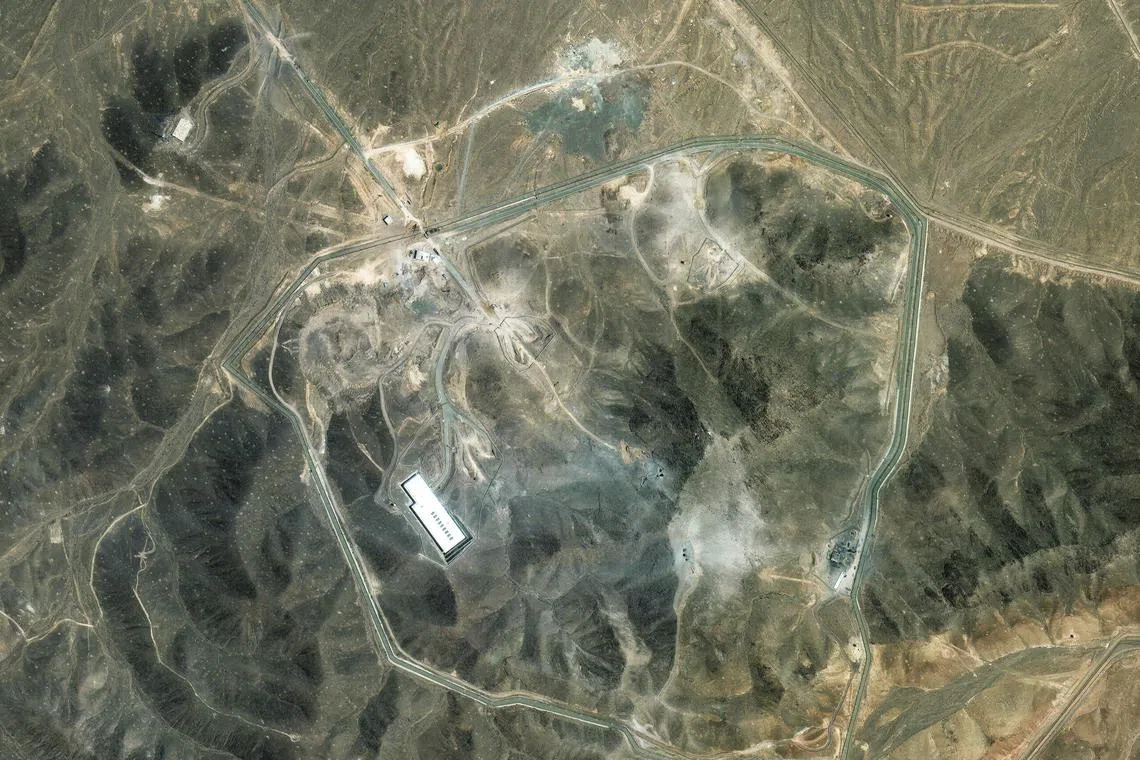Iran shuts out nuclear monitors in tactics that recall Cold War
Sign up now: Get ST's newsletters delivered to your inbox

Policymakers on both sides of the conflict are reacquainting themselves with so-called strategic ambiguity.
PHOTO: NYTIMES
Follow topic:
Iran is keeping its nuclear ambitions more closely guarded than ever after attacks by Israel and the US in June, introducing additional ambiguity to the Islamic Republic’s diplomatic showdown with Washington.
After formally cutting off International Atomic Energy Agency (IAEA) inspections
The IAEA’s Incident and Emergency Centre was activated June 13 and had been in continuous contact with counterparts in Iran, but that information sharing has tailed off, they said.
The communication blackout underscores the degree to which Iran is using silence as a way to obscure international understanding over the status of its nuclear program.
Tehran had previously allowed an average of more than one IAEA inspection a day and took part in five rounds of talks with the US about a deal to curb its atomic activities, but the Israeli assault has changed the equation.
US President Donald Trump has repeatedly said Iran’s nuclear facilities have been “obliterated”
Yet the view of the IAEA is that, while sites at Natanz and Fordow have suffered some damage, uranium-enrichment activity could resume in a “matter of months”, director-general Rafael Mariano Grossi told CBS News over the weekend.
The whereabouts of Iran’s 409kg inventory of near-bomb-grade uranium is also unknown.
Given the fuel can be stored in 16 cylinders each the size of a large scuba-diving tank, there is at least a possibility it has been transported to an undeclared location.
With no near-term resumption of IAEA monitoring in prospect, policymakers on both sides of the conflict are reacquainting themselves with so-called strategic ambiguity – a key element to nuclear brinkmanship during the Cold War.
By introducing a level of uncertainty about their intentions, goes the theory developed by Nobel Laureate Thomas Schelling among others, adversaries may be able to prevent a slide into total war.
“It remains to be seen if Iran dashes for a bomb or not, but what is clear is that the US strikes will drive the programme further underground,” said Dr Dina Esfandiary, who covers the Middle East for Bloomberg Economics.
“Iran is learning that strategic ambiguity will be its best option.”
Next phase
The situation raises questions about the next phase of the US and Israeli mission to curb Iran’s ability to build a nuclear weapon
Mr Trump offered an olive branch to Iran on June 29, suggesting in an interview with Fox News he could offer the country relief from stringent economic sanctions in return for assurances of peace.
That jarred – at least in tone – with comments posted by Mr Trump on Truth Social two days earlier, where he responded furiously to claims of victory by Iran’s Supreme Leader Ayatollah Ali Khamenei and said he had “dropped all work on sanction relief” as a result.
Iran’s government, meanwhile, said it remains skeptical its US-brokered ceasefire with Israel will last, adding it would respond to any new attacks.
Regarding the prospect of fresh talks with the US, a government spokeswoman said on July 1 that “no decision has been made”.
To help deter against a renewed assault, Iran could use uncertainty over the whereabouts of its highly enriched uranium to try to dictate events.
For the US and Israel to gain knowledge of the state and location of the stockpile, physical inspections and verification will need to be carried out, most likely via negotiated access for the IAEA.
The other option for Israel and the US would be a return to military action – a far from straightforward equation.
For Israel, the cost of the 12-day war may have been as high as US$12 billion (S$15 billion), Finance Minister Bezalel Smotrich said last week, while domestic damages of about US$3 billion would be the most for any conflict in Israel’s history.
In the US, direct military involvement has split key elements of the Republican Party and could carry political costs for the Trump administration.
For now, Iran is reinforcing the ambiguity.
The country’s Guardian Council last week approved a law suspending cooperation with the IAEA, but this is viewed as primarily a symbolic act. It is unclear how much work IAEA monitors could do even if they had access, given the risk of chemical and radiological contamination at bombed nuclear installations.
For Iran to permanently bar IAEA inspectors, it would need to exit the international Non-Proliferation Treaty – which aims to prevent the spread of nuclear weapons – a move that would potentially end monitoring altogether.
While such a move could yield even more diplomatic leverage for Iran, it would also carry new risks, according to Ms Darya Dolzikova, a senior research fellow at the Royal United Services Institute, a London-based think tank.
“Ambiguity is not cost free,” she said.
“In the absence of verification, Iran will have lost the ability to send credible signals about its nuclear programme. It can still formulate a narrative, but one with lower credibility.” BLOOMBERG

